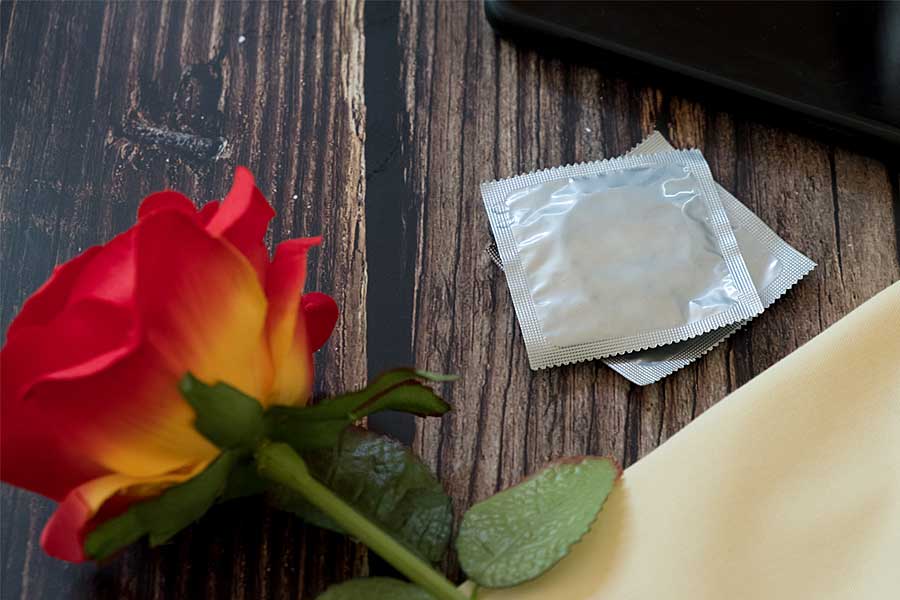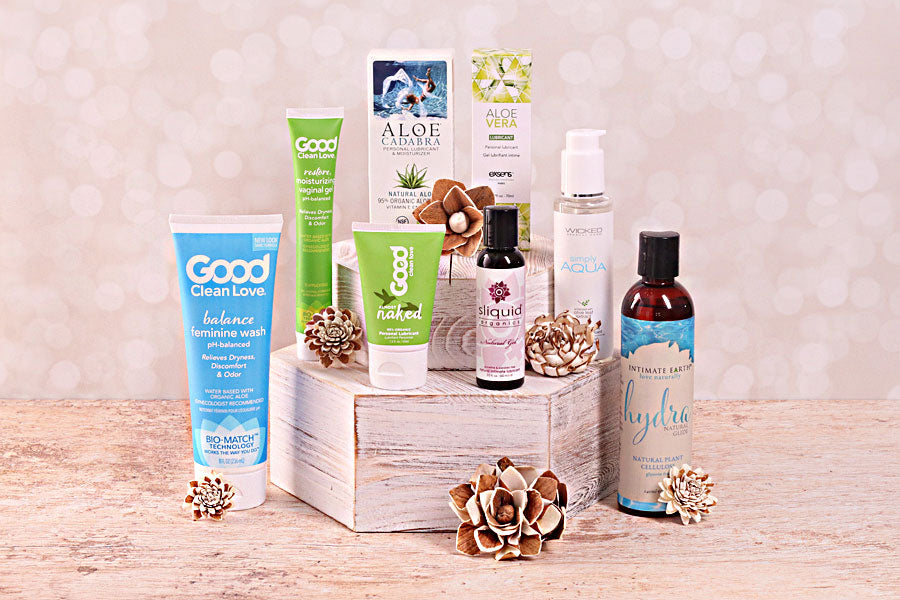Trusted for 25+ Years
Condoms & Dental Dams

Dr. Lisa Lawless, CEO of Holistic Wisdom
Clinical Psychotherapist: Relationship & Sexual Health Expert

What We Will Cover
Here we will cover various aspects of condoms, female condoms, and dental dams, including disposal and recycling, as well as tips for using them and lubricants to avoid. Because condoms, female condoms, and dental dams have become so common, it is easy to assume we know everything about them. However, there have been some new developments in the world of condoms, and there may be some things that you may learn that will help make your sex life safer and more pleasurable.
Condom Materials
Condoms and female condoms are the only form of protection that can help stop the transmission of sexually transmitted diseases (STDs) such as HIV and prevent pregnancy. They are typically made with latex, polyurethane, or polyisoprene; however, silicone condoms have been considered for future production. For more about advancements in condoms, please see our helpful guide: New Condoms: Latest Developments.
If you use polyurethane condoms, please read our guide, The Myth About Polyurethane Condoms & Lubricants.
Putting On A Condom
Unrolling & Squeezing The Air Out
Roll the condom onto the wearer's penis about one inch. Then squeeze the air out of the reservoir tip with your thumb and forefinger. For condoms without a reservoir, allow a little slack at the tip and pinch out any air. This will be much easier to do if the inside of the condom is lubricated.
Tips On Using Condoms
- Put a condom on after the penis is erect (hard).
- If using a spermicide, put some inside the condom tip.
- After ejaculation and before the penis gets soft, grip the rim of the condom and carefully withdraw from your partner.
- If the condom does not have a reservoir tip, pinch the tip enough to leave a half-inch space for the semen to collect.
- Extreme temperatures, especially heat, can make latex brittle or gummy (like an old balloon). Therefore, don't store condoms in hot places like a glove compartment, your wallet, or back pocket for any length of time.
- If you carry a condom around for more than a few weeks without using it, throw it out and store a new one.
- If a penis is uncircumcised, the foreskin must be pulled back before putting on the condom.
- Make sure the condom is right-side out.
Putting On A Condom Using Your Mouth
Putting a condom on with your mouth can make the whole process more erotic. Yes, the person putting it on will have a rubbery taste in their mouth, so you may want to reduce that flavor by using flavored condoms or flavored lubricants.
- Put the condom so that it will unroll away from you.
- Put the condom in your mouth with the tip facing the back of your throat.
- Allow the ends of the condom to sit in front of your front teeth, between your gums, and inside your bottom lip.
- Squeeze the tip of the condom to remove the air by flattening the tip between your tongue and the roof of your mouth.
- Slide it down the shaft of their penis, avoiding breaking the condom with your teeth.
- Do not allow your mouth to touch any part of the penis shaft or surrounding areas.
Do's & Don'ts For Condoms
DO
- Check what lubricants are safe with the type of condom you are using.
- Use a new condom for every act of intercourse.
- Put a condom on before any contact between the penis and any part of the partner's body.
- Wrap a used condom in a tissue and throw it in the trash.
DON'T
- Don't use your teeth, scissors, or sharp nails when opening a condom wrapper, and make sure you can see what you're doing.
- Never use lubricants that contain oils, fat, or greases such as petroleum jelly (Vaseline), baby oils or lotion, hand or body lotions, cooking oils, or oily cosmetics like cold cream. They can seriously weaken latex, causing a condom to form tin holes easily and tear.
- Never use the same condom for vaginal and anal intercourse.
- Never use a condom that has been used by someone else.
- Don't flush them down the toilet; they will come back to haunt you.
As Birth Control & STD Protection
Using Condoms For Contraception
Condoms are easy to use, inexpensive, protect against sexually transmitted diseases, and have a 2% per-year pregnancy rate as birth control when properly used. Condoms may be combined with other forms of contraception (such as spermicide) for greater protection.
What Can Condoms Help Prevent?
- Pregnancy
- Chlamydia
- Gonorrhea
- Herpes
- HPV Genital Warts
- Hepatitis B, C, and D
- Syphilis
- HIV/AIDS
What Can't Condoms Prevent?
- Crabs/Pubic Lice
- Molluscum Contagiosum - a viral infection of the skin or occasionally of the mucous membranes.
- Chancroid - is a sexually transmitted infection characterized by painful sores on the genitalia.
- Herpes
- Genital warts (if present on the skin around the genitals)
Issues With Nonoxynol 9
Nonoxynol 9 is a spermicide that was thought to help prevent pregnancy and the transmission of HIV and other STDs, but it is now known to be ineffective. Some people have an allergic reaction to Nonoxynol 9 that can result in little sores, making the transmission of HIV more likely. For more information, please see our helpful guide: Spermicide & Latex Allergies.
Textured Condoms
Ribbed condoms are textured with ribs or bumps, increasing sensation for both partners. Condoms also come in various colors. It's up to you which shape you choose. The differences in shape are designed to suit different personal preferences and enhance pleasure. It is essential to communicate with your partner to be sure that you are using condoms that satisfy you.
The Right Condom Fit
The condom will need to fit snugly around your partner's penis shaft. It shouldn't slide around. Wearing a snug condom at the bottom of the base of the penis or using a penis ring will help prevent slipping. The trade-off is sensation; the more snug a condom is, the less sensation a man typically gets, so using a snug penis ring to hold a condom on may help provide increased sensation.
When A Condom Is Too Small
Condoms that are too tight may cause a numbing sensation that decreases feeling, thus making staying aroused or ejaculating more difficult. True, it can prolong sex, as it can act as a penis ring, but if you are struggling with erectile dysfunction (ED), you may desire a looser condom and a penis ring that snuggly holds it on.
Magnum XL
It is one of the widest latex condoms available. For those familiar with the original Magnum, XL, it is nearly 15% wider and about the same length. The XL is about 15% wider than Trojan Large, 30% larger than average-sized condoms, and is the best choice for men who need protection with extra space.
Preventing Condoms Coming Off During Sex
Perhaps while having sex, you suddenly realize that the condom isn't on anymore. You look everywhere and still can't find the condom. Is it possible to have the condom stuck inside of you? How far up could the condom go? Learn more through our Condom Came Off During Sex Guide.
The Erection Factor
Erections can come and go, so the condom may loosen its grip and slip off. If this is an issue, a smaller-sized condom, or saying and doing things that will maintain arousal during sex, may help in this situation. Be aware that desensitizing cream can also cause a loss or lowered erection. On the other hand, penis rings can assist with maintaining an erection and keeping the penis harder and more engorged. Using a penis ring over a condom can also help them stay on.
Withdrawing Correctly
When withdrawing, hold onto the rim of the condom with your fingers (or with your partner's fingers). This can prevent the condom from coming off.
Condom Safety
In the USA, condoms should be FDA approved; in Britain, they should carry the British Standard Kite Mark or the EEC Standard Mark (CE), and elsewhere in the world, they should be ISO approved.
Condoms have an expiration (Exp) or manufacture (MFG) date on the box or individual package that tells you when it is safe to use the condom. It's important to check this when you use a condom. You should also make sure the package and the condom appear in good condition. Condoms can deteriorate if not stored properly as they are affected by both heat and light. So it's best not to use a condom that has been stored in your back pocket, your wallet, or the glove compartment of your car. If a condom feels sticky or very dry, you shouldn't use it as the packaging has probably been damaged.
Condom Excuses
People often use the following lines to talk people out of using a condom. We shall address them below by providing helpful responses.
Don't you trust me?
This is not about trust; people can have infections without realizing it.
It does not feel as good with a condom.
We can do things to make it feel better for you, but we won't be having sex without it.
I don't stay hard when I put on a condom.
I'll help you put it on; that will help you keep it hard.
I can't feel a thing when I wear a condom.
Maybe that way, you'll last even longer, which will make up for it.
Putting it on interrupts everything.
Not if I help put it on.
I guess you don't love me.
I do, but I don't need to prove it this way.
I will pull out in time.
Women can get pregnant and get STDs from pre-ejaculate.
But I love you.
Then you'll help us to protect ourselves.
Just this once.
Once is all it takes.
Condom Accessories
French Ticklers
A French tickler is a condom-like penis sleeve with a textured tip designed to enhance sexual pleasure. A typical French tickler uses several bumps in the latex lining to make sexual intercourse more enjoyable or pleasurable for the recipient. They have become less popular with advancements in sex toys such as penis extenders and vibrating penis rings, which stimulate partners more. Because their thick ends decrease sensitivity, they may help in prolonging sex. Ticklers put more stress on the tip and are more easily broken, so they are not as safe as regular condoms.
Lubricants
Using lubricants with condoms is a great idea. It will enhance the sensations of both people, and it will significantly increase the safety of using a condom by decreasing the chances of it breaking. Because unlubricated condoms are often quite dry inside, they can further dull sensation by ceasing any friction against the penis. Therefore, using a bit of lubricant on the tip of the penis is often helpful. Do not put lubricant toward the end of the condom, as this may make the condom slide off the base of the penis more easily.
Using lubricants outside a condom is also an excellent idea for both vaginal and anal sex. It allows the protected penis to slide more easily in and out, enhancing pleasure for both parties.
Penis Rings
Penis rings can go over a condom at the base of the penis and allow for a more secure and more snug fit while holding blood in the penis for a firmer erection. If you use one with a clitoral or anal stimulator, you can provide added stimulation to your partner and yourself. In addition, if you use one with a testicle ring, you can prolong sex as the extra ring will keep your testicles from pulling upward into your body, which happens when one ejaculates.
Internal Condom Basics
Why Are Internal Condoms Important?
In 2018, the Food and Drug Administration (FDA) reclassified female condoms as internal condoms. This was done because they can be used both vaginally and anally by any gender. Brands that still list them as female condoms are outdated and fail to acknowledge these products' inclusive nature. What is especially remarkable about internal condoms is that they come in one size, which fits any rectum or vagina and can accomodate any size penis.
Internal condoms are the only form of protection for the vagina or rectum that can help stop the transmission of sexually transmitted diseases (STDs) such as HIV and prevent pregnancy beyond condoms worn on the penis.
What Is An Internal Condom?
The internal condom is a thin sheath or pouch worn vaginally or anally during penetrative sex. It lines the vagina or rectum and helps prevent pregnancy and/or sexually transmitted diseases (STDs), including HIV.
How Well Do Internal Condoms Work Regarding Pregnancy?
Of one hundred who have used internal condoms vaginally, twenty-one will become pregnant during the first year of typical use. Five will become pregnant with perfect use.
How An Internal Condom Is Used
Detailed instructions for correct use are included in the packaging for an internal condom. Be sure to read and understand them before you use them. However, here are some basic guidelines:
- To insert the internal condom, lubricate the closed end. Squeeze together the sides of the inner ring at the closed end of the condom and insert it into the vagina or rectum like a tampon or butt plug.
- Push the inner ring into the anus or vagina as far as it can the ring is close with the anus or opening of the vagina. Withdraw your finger and let the outer ring hang about an inch outside the vagina or anus.
- During intercourse, movement of the condom from side to side is normal.
- Stop intercourse if the penis slips between the condom and the walls of the rectum or vagina or if the outer ring is pushed into the vagina or rectum.
- If ejaculation has not occurred, gently remove the condom from the rectum or vagina, add extra lubricant, and insert it once again.
- To remove the internal condom, squeeze and twist the outer ring to keep semen inside the pouch.
- Gently pull it out of the vagina or rectum.
- Throw it away. Do not flush. Do not reuse.
Dental Dams
Dental dams are small, thin, square pieces of latex used for oral-vaginal or oral-anal sex. They get their name from their use in dental procedures. They help reduce the transmission of STDs during oral sex by acting as a barrier to vaginal and anal secretions containing bacteria and viruses. They come in various sizes and flavors, so you can find a dam that satisfies your tastes.
Because dental dams act as a barrier to bodily fluids, they help reduce STD transmission. Many STDs, such as herpes, genital warts, and HIV, can be transmitted through oral sex. Like condoms, dental dams must be used correctly and consistently to be effective. To reduce the rubber taste, you can rinse the dental dam to remove the powder they are often covered in (which can not only irritate the genital area but can leave a funny taste in the mouth).
Dental Dam Alternatives
You can always buy a latex glove and make your own for those who are too embarrassed to purchase one online or in a store. To make your dental dam, cut open the latex glove along one side, and presto, there you have it, your homemade dental dam. Dental dams are an extremely effective means of preventing vaginal or anal secretions infection. There is little data available on infection rates after using the dental dam.
A second option is less effective because it is untested, but some people claim that plastic wrap may also help prevent the transmission of some infections. If you are to try this method, you may want to use a few sheets as there is no way to know if it is an effective form of safe sex.
How the Dental Dam Is Used
Although it may seem awkward to use at first, dental dams are extremely easy. Before using the dam, you may want to rinse off any powder on the dam and check the dam to make sure there are no holes or perforations. The partner performing oral sex will hold the dam against the vulva/labia or anus of the receiving partner. You have to keep holding the dental dam in place while using it as if it moves and allows body fluids to get over the top; then, you have just defeated the safety point.
Lubricant
Put some lubrication between the labia/anus and the dental dam to increase sensation. You can opt to apply a lubricant on the vulva or anus before using the dam. The lubricant can help improve the sensation of the recipient. Just make sure the lubricant is a water-based lube because oil-based lubes and lotions can degrade the latex and decrease the dam's effectiveness. We recommend using a flavored lubricant for extra pleasure for the user.
What To Avoid While Using A Dental Dam
- When using the dental dam, be sure only to use one side. Don't flip the dam over for another round because you will expose yourself to the fluids you're trying to avoid.
- Do not reuse a dam on another body part (e.g., from anus to vulva/labia or vice-versa) because you can transfer germs from one body area to another.
- You may want to have several dams nearby and ready for use and mark the dams on one side with a pen so that if the dam gets set aside during passionate foreplay, you'll know which side is for the licker and which for the lickee. Better yet, use a new dam and avoid the possibility of exchanging body fluids.
- Do not reuse a dam for another act of oral sex later on, either. Dams are for one-time use only.
Can You Feel Anything Using A Dental Dam?
The latex feeling will be different from a tongue, but that's not necessarily a bad thing. Using a dental dam with lube can offer your partner a new type of stimulation.
Recycling Condoms
Condoms cannot be recycled and most are not biodegradable. For more about this, please see our helpful guide: Eco-friendly Condoms.





